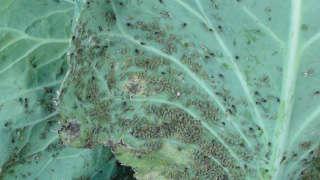
Guru GyaanAgroStar Agronomy Centre of Excellence
Cabbage & Cauliflower: Management of aphids
Normally, farmers are raising cabbage and cauliflower crops throughout the year. Aphids and diamond back moth are the major pests damaging to these crops. Pests can be manage by maintain the transplanting period and following appropriate control measures.
• Aphids suck the cell sap from the leaves and heads. On higher infestation, black sooty mold is developed and hindered the photosynthetic activity of plants. Leaves are wrinkle and deformity occurs. No or poor formation of head on infested plants. Finally, quality, production and market prices are affected.
• The population of aphids is negligible in the crop transplanted during 4th week of October to 1st week of November. Heavy population is observed in late transplanted crop.
• The infestation is increased on increasing the temperature and humidity,
• Install 10 yellow sticky traps per acre in the field for monitoring and management of aphids.
• On significant population of ladybird beetles feeding on aphids, avoid or delay the application of insecticides.
• Abundant population of Diaeretiella repae, a parasitoid is observed and perform significant role in reduction of the population of aphids.
• In place of chemical insecticides, spray neem seed kernel suspension 500 g (5% extract) or neem based formulation 20 ml (1% EC) to 40 ml (0.15% EC) per 10 liter of water.
• For taking the advantages of biopesticides for the management of aphids, spray fungus base powder, Verticillium lacani or Beauveria bassiana 40 g per 10 liter of water on initiation of aphids.
• On higher infestation of aphid, spray Acetamprid 20 SP @ 3 g or Cyantraniliprole 10 OD @ 3 ml or Diafenthiuron 50 WP @ 10 g or Tolfenpyrad 15 EC @ 10 ml per 10 liter of water.
Source: AgroStar Agronomy Centre of Excellence
If you find this information useful, click on the yellow thumbs up sign under the photo and also share this with your farmer friends using the options given below.
102
0

